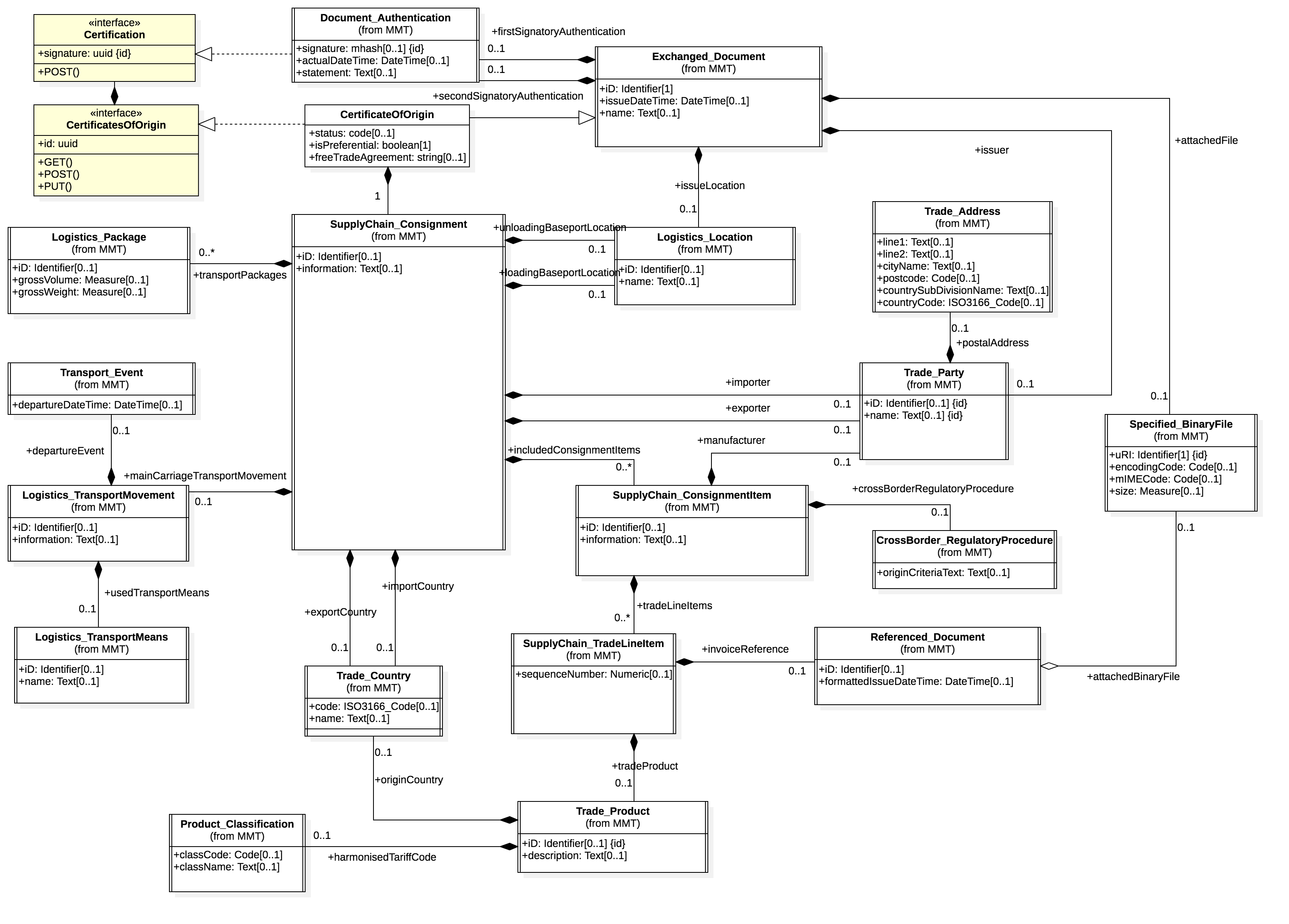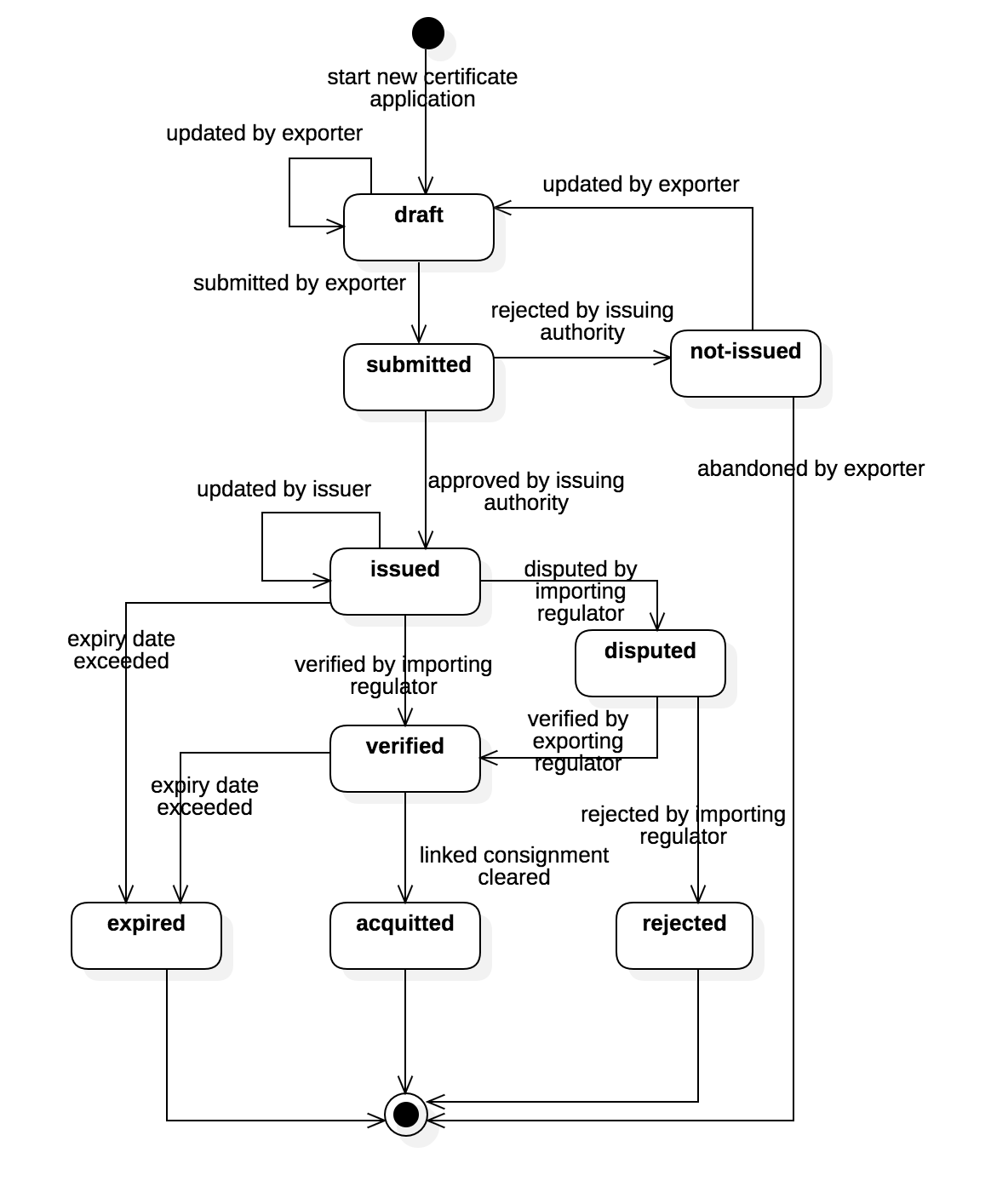- Spec ID:
certificates/1
- Editor:
- Contributors:
- Export to Doc
Introduction
Regulatory processes often involve certificates that assert compliance of a shipment with some specification or legislative framework. For example
- A Certificate of Origin (CoO) is issued by an accredited body on behalf of an exporter and is required by the importing regulator. It asserts that the goods in a consignment conform to the terms of a Free Trade Agreement (FTA) and so may attract concenssional duty terms.
- A Certifictae of Non Manipulation (CoNM) is issued by an accredited body on behalf of a transhipment port/country and it asserts that goods in a consignment were not altered during transhipment.
- A PhtoSanitary certificate is issued by an accredity authority on behalf of an exporter of food products and is required to meet the food safety standards of the importing regulator.
- And dozens of others.
In most cases certificates are about a consignment of goods. Accordingly, the edi3 approach to defining the data model of certifictaes is to “attach” certificate data to the existing UN/CEFACT trade and transport data models.
Goals
To publish a consistent suite of data models and state lifecycles for various certifictaes used to satisfy regulatory processes and to support the Inter Customs Ledger project.
Status
- This specification is in
state. This means that design consensus has been reached and the specification is ready for implementation verification.
Glossary
| Phrase | Definition |
|---|---|
| CoO | Certificate of Origin |
| CoNM | Certificate of Non Manipulation |
| FTA | Free Trade Agreement |
| RDM | Reference Data Model |
Licence
All material published on edi3.org including all parts of this specification are the intellectual property of the UN as per the UN/CEFACT IPR Policy.
This Specification is free software; you can redistribute it and/or modify it under the terms of the GNU General Public License as published by the Free Software Foundation; either version 3 of the License, or (at your option) any later version. See http://www.gnu.org/licenses.
Change Process
This document is governed by the 2/COSS (COSS).
Language
The key words “MUST”, “MUST NOT”, “REQUIRED”, “SHALL”, “SHALL NOT”, “SHOULD”, “SHOULD NOT”, “RECOMMENDED”, “MAY”, and “OPTIONAL” in this document are to be interpreted as described in RFC 2119.
Certificate Of Origin
Data Model
The Certificate of Origin (CoO) Data model is drawn from the UN/CEFACT Buy-Ship-Pay reference data model and conforms to the edi3 UML profile specification

State Lifecycle
The certificate state lifecycle is shown below. The “status” property of the “CertificateOfOrigin” entity in the API model MUST equal one of these values.

Open API Soecification
The Data Model has been used to generate an API Specification in accordance with Open API3.0 standard. The API specifciation is published in YML and HTML (swagger UI)
JSON Schema
For use via other protocols than OpenAPI, a CoO JSON schema is also provided
Sample Data
to assist with implementaiton and with mapping to typical PDF certificate layouts, some sample data files are provided. All samples use the same data set which represents a CHAFTA preferential certificate for an export of 6 pallets of 3 different wine products from Australia to China.
It is expected that simple implementations may permit the exchange of certificates as PDF files with supporting structured meta-data. This use case is supported by this specificaiton. Typically implementers will
- either implement the full data set as structured JSON
- or implement the mimimal data set as structured JSON and include the PDF certificate as URL reference.
Certificate of Non Manipulation
To be completed
